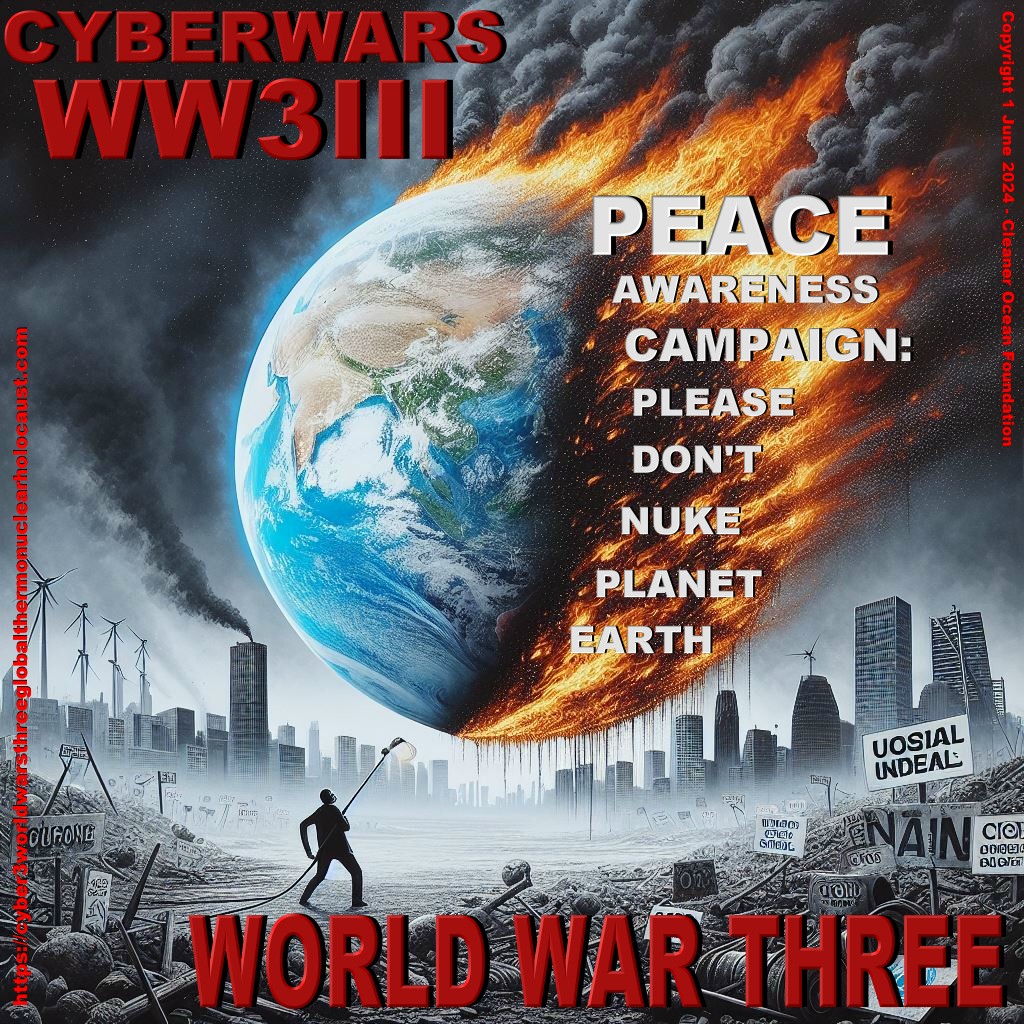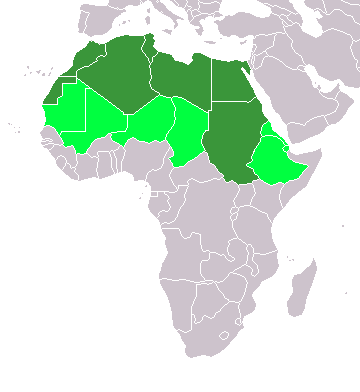|
NORTH AFRICA
Please use our A to Z INDEX to navigate this site
|
|||
|
DOOMSDAY OPERATION GRAND SLAM - Disillusioned extremists in Iran, North Korea and Russia, have grown impatient waiting for their leaders to act decisively, having watched the Ukraine debacle of Vladimir Putin rebound to weaken their CRINK axis members. This despite Hamas launching against Israel and Houthi attacks on the Red Sea. All that had the effect of waking the sleeping giant: NATO.
They
hatch a plot to kidnap top politicians from the west to create confusion,
as a prelude to an all out cyber
nuclear first and second strike, having first stockpiled sufficient gold
and weapons reserves, and fallout bunkers for their cells, to be able to
stage a second wave of conventional attacks, to in effect, take over the
world after the nuclear holocaust they
have engineered. Including assassinating their jaded leaders: Xi
Jinping; Vladimir
Putin, Iranian Grand Ayatollah, Ali
Khamenei, and Kim
Jong Un, supreme leader of communist North
Korea.
North Africa or Northern Africa is the northernmost region of the African continent, generally divided by the formidable barrier of the Sahara from Sub-Saharan Africa. Geopolitically, the UN definition of Northern Africa (which coincides with common reckonings of the region) includes the following seven territories:
The Spanish plazas de soberanía (exclaves) are on the southern coast of the Mediterranean Sea, surrounded by Morocco on land.
The Spanish Canary Islands and Portuguese Madeira Islands in the North Atlantic Ocean are northwest of the African mainland and often included in this region.
Geographically, the Azores, Mauritania, Mali, Niger, Chad, Ethiopia, Eritrea, and Djibouti are sometimes included.
The Maghreb includes Western Sahara (claimed by Morocco), Morocco, Algeria, Tunisia, Mauritania and Libya. North Africa generally is often included in common definitions of the Middle East, since they in many respects have closer ties to Western Asia than to sub-saharan Africa. In addition, the Sinai Peninsula of Egypt is part of Asia, making Egypt a transcontinental country.
North Africa██ Northern Africa (UN subregion) ██ geographic * Disputed territory of Western Sahara is administered by Morocco; the Polisario Front also claims it.
Landscape
The Atlas Mountains, which extend across much of Morocco, northern Algeria and Tunisia, are part of the fold mountain system which also runs through much of Southern Europe. They recede to the south and east, becoming a steppe landscape before meeting the Sahara desert which covers more than 90% of the region. The sediments of the Sahara overlie an ancient plateau of crystalline rock, some of which is more than four billion years old.
People
The inhabitants of North Africa are generally divided in a manner roughly corresponding to the principal geographic regions of North Africa: the Maghreb, the Nile Valley, and the Sahara. Northwest Africa on the whole is believed to have been inhabited by Berbers or Amazighs since the beginning of recorded history, while the eastern part of Northern Africa has been home to the Egyptians, Abyssinians (Ethiopians) and Nubians (Sudanic descent), although ancient Egyptians record extensive contact in their Western desert with peoples that appear to have been Berber or proto-Berber. Following the Muslim-Arab conquest in the 7th century AD, the region underwent a process of Arabization and Islamization that has defined its cultural landscape ever since. Questions of ethnic identity usually rely on an affiliation with Arabism and/or Islam, or with indigenous cultures and religions. Northern Africans exhibit a wide range of phenotypical characteristics from fair to dark-complexioned
Culture
The people of the Maghreb and the Sahara speak various dialects of Berber and Arabic, and almost exclusively follow Islam. The Arabic and Berber groups of languages are distantly related, both being members of the Afro-Asiatic family. The Sahara dialects are notably more conservative than those of coastal cities (see Tuareg languages). Over the years, Berber peoples have been influenced by other cultures with which they came in contact: Nubians, Greeks, Phoenicians, Egyptians, Ethiopians, Romans, Vandals, Arabs, and lately Europeans. The cultures of the Maghreb and the Sahara therefore combine indigenous Berber, Arab and elements from neighboring parts of Africa and beyond. In the Sahara, the distinction between sedentary oasis inhabitants and nomadic Bedouin and Tuareg is particularly marked.
The diverse peoples of the Sahara are usually categorized along ethno-linguistic lines. In the Maghreb, where Arab and Berber identities are often integrated, these lines can be blurred. Some Berber-speaking North Africans may identify as "Arab" depending on the social and political circumstances, although substantial numbers of Berbers (or Imazighen) have retained a distinct cultural identity which in the 20th century has been expressed as a clear ethnic identification with Berber history and language. Arabic-speaking Northwest Africans, regardless of ethnic background, often identify with Arab history and culture and may share a common vision with other Arabs. This, however, may or may not exclude pride in and identification with Berber and/or other parts of their heritage. Berber political and cultural activists for their part, often referred to as Berberists, may view all Northwest Africans as principally Berber, whether they are primarily Berber- or Arabic-speaking.
The Nile Valley through northern Sudan traces its origins to the ancient civilizations of Egypt and Kush. The Egyptians over the centuries have shifted their language from Egyptian to modern Egyptian Arabic (both Afro-Asiatic), while retaining a sense of national identity that has historically set them apart from other people in the region. Most Egyptians are Sunni Muslim and a significant minority adheres to Coptic Christianity which has strong historical ties to the Ethiopian Orthodox Church. In Nubia, straddling Egypt and Sudan, a significant population retains the ancient Nubian language but has adopted Islam. The northern part of the Sudan is home to the, largely, Arab Muslim population, but further down the Nile Valley, the culturally distinct world of the largely non-Muslim Nilotic and Nuba peoples begins. Sudan is the largest and most diverse of all North African countries.
North Africa formerly had a large Jewish population, many of whom emigrated to France or Israel when the North African nations gained independence. A smaller number went to Canada. Prior to the modern establishment of Israel, there were about 600,000-700,000 Jews in Northern Africa, including both Sfardīm (refugees from France, Spain and Portugal from the Renaissance era) as well as indigenous Mizrāḥîm. Today, less than fifteen thousand remain in the region, almost all in Morocco and Tunisia, and are mostly part of a French-speaking urban elite.
History
The Arabs and Islam arrived in North Africa in 640 A.D. By 670, most of North Africa had fallen to Arab rule. The Berbers subsequently started to form their own kingdoms in response to this threat in places such as Fez, Morocco, and Sijilimasa. In the eleventh century, a reformist movement made up of members that called themselves Almoravids, launched a jihad against the kingdoms to the south in the Savanna. This movement solidified the faith of Islam, and allowed for penetration into sub-sahara Africa. After the Middle Ages the area was loosely under the control of the Ottoman Empire, except Morocco. After the 19th century, it was colonized by France, the United Kingdom, Spain and Italy. In World War II from 1940 to 1943 the area was the setting for the North African Campaign. During the 1950s, 1960s and into the 1970s, all of the North African states gained independence. There remains a dispute over Western Sahara between Morocco and the Algerian-backed Polisario Front.
Land and sea
Sheltered valleys in the Atlas mountains, the Nile valley and delta, and the Mediterranean coast are the main sources of good farming land. A wide variety of valuable crops including cereals, rice and cotton, and woods such as cedar and cork, are grown. Typical mediterranean crops such as olives, figs, dates and citrus fruits also thrive in these areas. The Nile valley is particularly fertile, and most of Egypt's population lives close to the river. Elsewhere, irrigation is essential to improve crop yields on the desert margins.
Many north African nomads, such as the Bedouin, maintain a traditional pastoral lifestyle on the desert fringes, moving their herds of sheep, goats and camels from place to place - crossing country borders in order to find sufficient grazing land.
Transport and industry
The economies of Algeria and Libya were transformed by the discovery of oil and natural gas reserves in the deserts. Morocco's major exports are phosphates and agricultural produce, and as in Egypt and Tunisia, the tourist industry is essential to the economy. Egypt has the most varied industrial base, importing technology to develop electronics and engineering industries, and maintaining the reputation of its high-quality cotton textiles.
Oil rigs are scattered throughout the deserts of Libya and Algeria. Libyan oil is especially prized because of its low sulphur content, which it means it produces much less pollution than other fuel oils.
Solar Cola 500ml PET bottle LINKS and REFERENCE
Solar Cola drinkers care about planet earth
.. Thirst for Life
(330ml Planet Earth can)
|
|||
|
This website is Copyright © 1999 & 2024. The bird logo and name Solar Navigator are trademarks. All rights reserved. All other trademarks are hereby acknowledged. Max Energy Limited is an educational charity.
|



